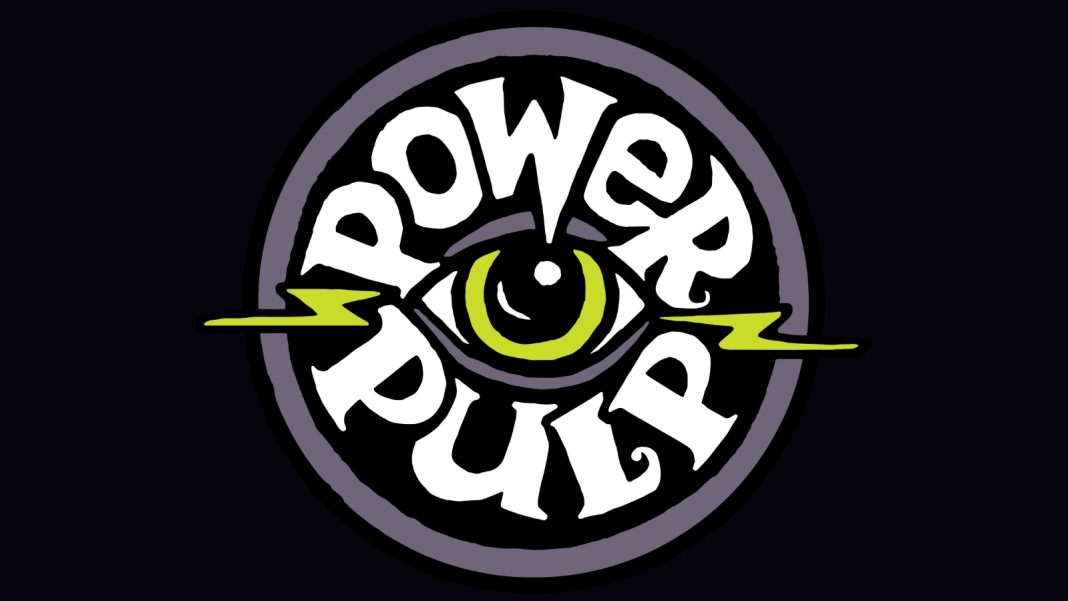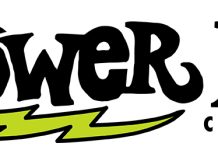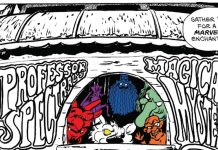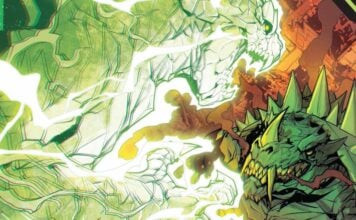The comics industry has been in a state of near-constant flux for years, with creators taking the brunt of its losses each time there’s another major shakeup. This has led to a rise in independent publishing (which has always boomed in comics, regardless) and collective action, including the debut of more than one comics co-op. Today marks the launch of one such collective, Power Pulp Comics, which boasts 13 creators who are ready to get really, really weird.
Power Pulp has a unique operating model. Billed as “a creator-led distro model disguised as a publisher,” 100 percent of profits go directly to creators, who publish and market their titles under one banner but are ultimately each responsible for their own books.
The Beat spoke with Power Pulp co-founding members and creators Chris Anderson, James Coats, and Corinne Halbert via e-mail about what sets their collective apart, their goals, why now is the right time to launch, and what readers can expect.
Samantha Puc for The Beat: What was the impetus for creating Power Pulp?
Chris Anderson: There is a book that I made and know people would love if they only had access to it, that I have boxes of in my closet. I knew as a single, self-publisher, there was no way for me to get distribution. So I wondered about creating a group of self-publishers to submit under an umbrella.
After talking to the Coats Brothers and Jamie Jones, who were both trying to come up with another method to get their books to a wider audience, we decided it was feasible to distribute ourselves. We pulled in a few other high-caliber creators and are pooling our resources, experience, and talent to get our books seen and create relationships with stores, and make our lives easier by spreading out the work.
James Coats: As current creators, this is something we have been discussing among ourselves for a while now. We are all inspired by the generation of self-publishers that came before us, like Jeff Smith, Paul Pope, Rick Veitch, and others. But the infrastructure they used to get into comics is gone and never coming back.
The model Diamond had and now Lunar has for smaller self-publishers isn’t really viable if you’re a creator trying to get your work into a wider audience. Comic book fans, comic shops, and creators always talk about creating a better, broader comic book market, and that is what we are trying to do with the Pulp.
Corinne Halbert: Chris and James reached out to me, which was a true delight and surprise! It seemed like a great opportunity to join forces with some like-minded creators and get our work into more shops.
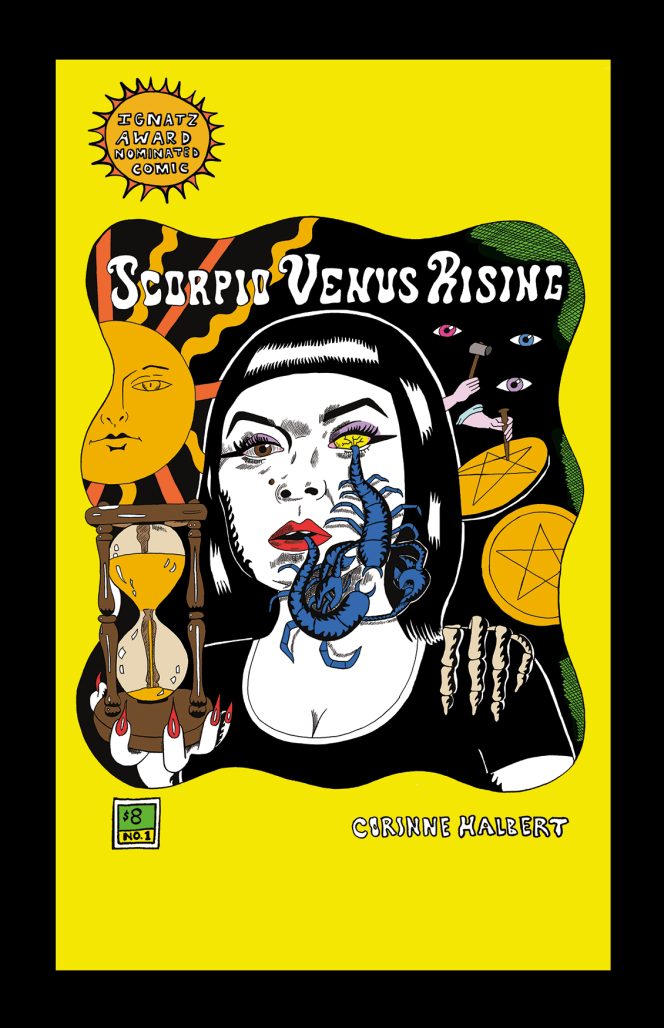
How does Power Pulp’s model differ from other independent comics publishers?
Anderson: Well, that’s just it. We aren’t a publisher at all. Everyone is their own business. But we come together under a banner of quality. In that regard, it functions as a publisher, but everyone is responsible for printing their own product. But instead of spending the money to hire, say, PR for one book, we can spread out the cost and focus on three books.
Being a self-publisher, you wear every hat. With Power Pulp, we can each wear one hat at a time, and since margins are so tight on independent books, we can lay that thinner as well. And to be clear, if a publisher comes along and wants to pick up a book from the line-up, and it makes sense to the creator, anyone is free to make that deal.
Coats: I think what is different about Power Pulp is that we are a collective of creators, and as a collective, we are all working together. We are pulling together all of our collective experiences to make the best comics we can, and to foster a better sense of community. By putting all these great comics under one banner, we believe it will help everyone with distribution and promotion, which are both tough endeavors if you’re a single self publisher.
Are there non-comics models that the collective takes after or is informed by?
Anderson: I’m sure there are. I don’t think we are totally reinventing the wheel. But I’m not sure I’ve ever heard of them. So many times I’ve sat at cons and heard people complain that the business is broken for our corner of the comics world. It just made sense to try and do something instead of navel-gazing and kicking the can over to someone else. You can’t make a change unless you try.
Coats: The thing we knew we needed, that I don’t think I have seen other collectives do, is create a distribution setup. We looked at this from the point of view of a comic book store and not a creator. And right now, as always, a big deal is shipping cost. If a store is trying to order comics from 25 different self-publishers that are all over the US and Europe and pay shipping on each little order, most likely, they are just going to forget about it. I know some stores go that extra mile, and others that want to, but that is extra work and money, and many stores operate on a tight budget as it is.
We have set up our own centralized shipping and distribution location, just like a publisher. So now a shop or a comic fan can jump onto the website catalog and find several cool-looking comics and get them in one order and at a much more affordable shipping rate.
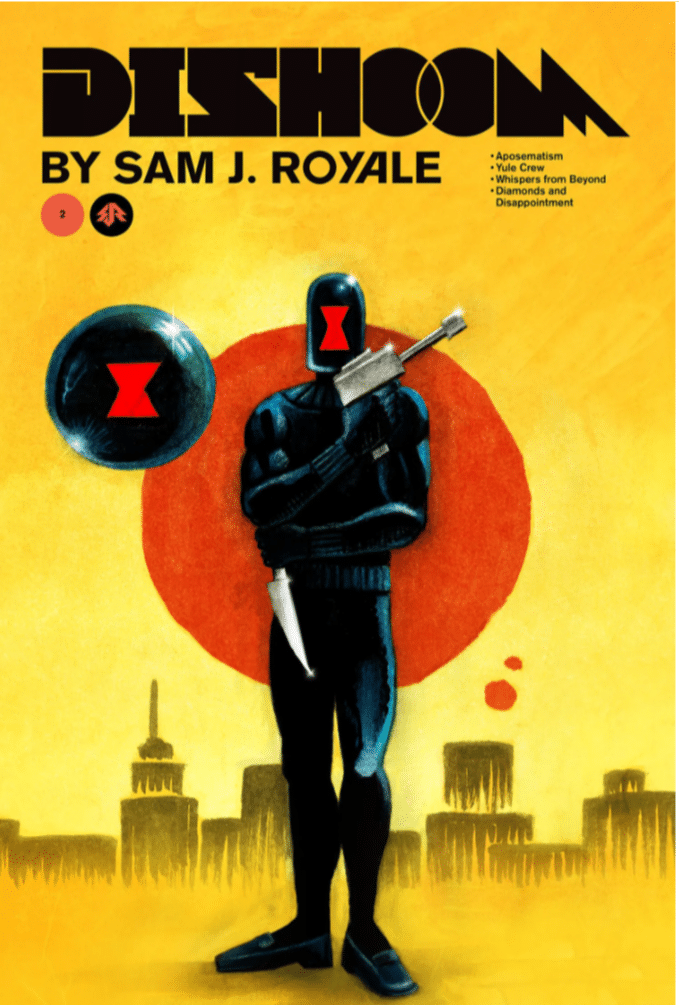
What are your operating principles or ethos?
Anderson: You know, we want to be fair, kind and positive, first and foremost. We wanted to make sure each creator got every penny that’s coming to them. That means some members are doing serious heavy lifting. James Coats built and designed the website, Sam J. Royale designed the awesome logo and retailer catalog, etc. Every member “owns” this and has a vested interest in making it succeed.
We also want to be kind and gracious to our “Power Partners,” the shops that come along for the ride, and treat them the same way we treat ourselves. We aim to initiate a dialogue and explore ways to support one another’s growth and success. Same goes for our fans. You email Power Pulp, you get one of us. Our door is open to anyone who wants to make the comics industry and community better.
Coats: Making comics is HARD. It is really impressive that anyone ever gets a book finished. It is even more impressive when it’s a cartoonist who doesn’t have a big publisher behind them. Most of us have day jobs, so we make comics in our spare time, and that can be tough. We want to foster a positive and creator-friendly comic community and help our members be successful.
How many creators are currently on board?
Anderson: Thirteen at the launch. We have Mattchee, Jamie Jones, Corinne Halbert, Tony Fero, Scott Gerard Ruhl, Matt King, James Coats, Brad Dwyer, John Coats, Sam J. Royale, Kirt Burdick, Pat Kain, and me. We have a few more big names to announce in the near future as well, who we are really excited to welcome into the fold.
Coats: Other than our strong initial group, we have a lot of creators who have expressed interest already. Like Chris said, we already have some more big names that will be announced soon.
Can more creators get involved? How?
Anderson: They can. The nature of the model requires it to be small. It’s two members who are housing the books and sending them out. As you can imagine, if we just throw open the doors, it can become unmanageable quite quickly. But we would love to see work from other serious, high quality creators. The Pulp is a democracy, so we will vote to decide who we want to bring in and how many are realistic. That said, if this model works, we don’t have to be the only ones doing this. The blueprint is fair use.
Coats: Yeah, it’s all logistics right now. We all really believe this is a model that can work, but we won’t know until it all gets rolling and we see if comic shops and fans jump on board. We will do the best we can to add more creators and help get their work out there as well, but we are a small collective just starting out.
What can readers expect from your launch?
Anderson: I think that what all of us do is walk this line, where we have one foot in the door of the Wednesday Warrior and one in the artistic, Fanta crowd, so to speak. So they are all books that everyone can enjoy. Person’s introspective work, bombastic Silver Age guys who knock each other around. The word that kept coming up is weird. But not the negative weird. The attractive, fun, and intriguing kind of weird.
Upon launch, we unleash them into the world. Ask your shop to become a partner. If you don’t have a shop, order some for yourself. Try something new. I guarantee it’ll feel both nostalgic and familiar and entirely fresh at the same time. And you can be happy knowing you aren’t giving your bucks to a mega corp. Every dollar goes to the creators and the shop you know and love.
Coats: Expect really fun comics. I think the lineup really takes you back to the golden age of self-publishing. Lots of unique, fun comics made by some really great people. This can be a new dawn for creators and fans, and I think there is something here for everyone.
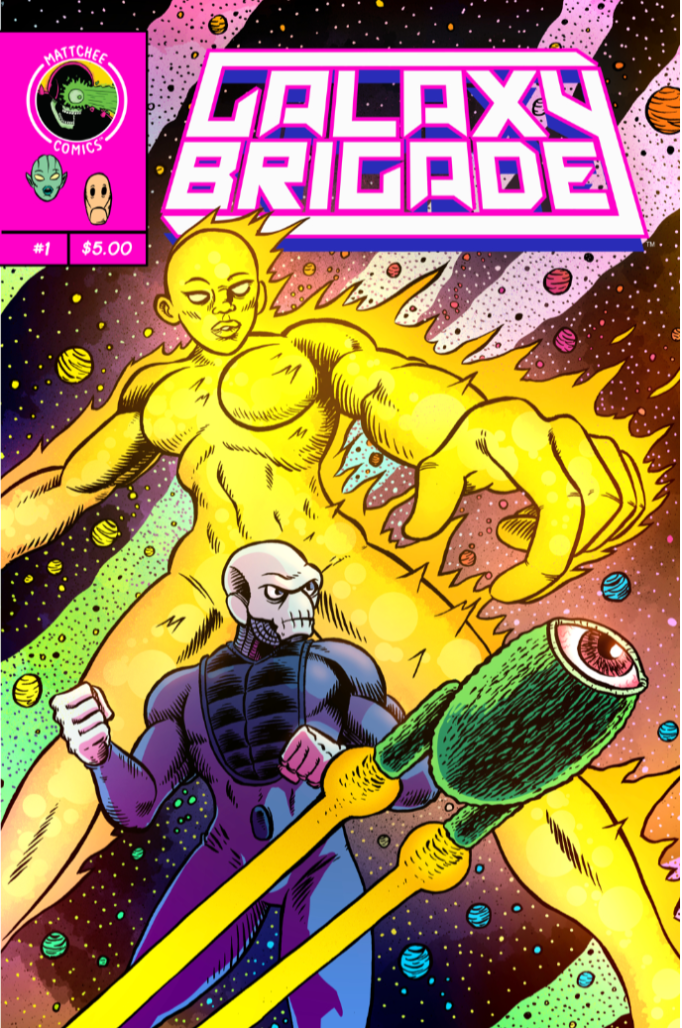
The industry has seen a lot of shake ups in the last five years—why have you chosen this moment in time to launch Power Pulp?
Anderson: Serendipity. We didn’t rush into this. The unraveling of the distribution model happened after the seed was planted. It grew right when it was supposed to.
Coats: With all the shake-ups ups the one constant is people working hard making great comics. It’s time to celebrate these cartoonists and make a better industry for us all.
Halbert: There’s strength in numbers. As someone who has worked on the retail side of comics at both Quimby’s in Chicago for six years and currently at Forbidden Planet in New York City, being able to get comics from a small press distributor is ideal. You can acquire work from a number of artists with one order, cutting out the extraneous details of reaching out to a bunch of folks individually. It can potentially help out the shops and the artists immensely.
What are your hopes for the future of comics?
Anderson: That more and more people discover how good this whole other world of finely tuned, oddball self-published work really is. As that expands, I hope the audience expands outside of comics. It would be lovely if they were once again as popular and omnipresent as in the golden age. I want to walk into a shop that doesn’t traditionally carry comics and find Power Pulp comics and, I guess, others too, on the counter or shelves next to Mr. Zog’s Sex Wax or socks or tarot cards or bread. I want to see them at the dentist’s office, at the mechanic’s garage, and the salon.
Coats: I hope that it becomes easier for creators to connect with people who might like their work. There is a comic book out there for everyone. Somewhere right now, a creator is making the perfect comic book for you; you just have to find it. Hopefully, we can help make that happen.
Halbert: As a woman in comics, I hope to see more financial growth opportunities for individual creators and more stories being put into the world by voices that have been too often suppressed. I personally hope indie comics continue to expand and grow in these areas exponentially. I’ve been extremely lucky to work with the amazing folks at Silver Sprocket. Part of Avi’s mission has been to lift up marginalized voices, people of color, queer creators, trans folks and women.
Is there anything else you’d like to add?
Anderson: If you’re a store, let’s talk. If you love comics at all, snag a few of our wares. Heck, snag two and give one to someone who has never read one. We can fan the flames of the medium we all love and remember that enthusiasm is contagious.
Coats: The time is now to make the comics market we all talk and dream about. Check out the website, and tell your local shops you want to see some Power Pulp books on the shelves. We are creators just like everyone else, and your support really means a lot to us.
Halbert: Comics is a true labor of love. When I go to start a new graphic novel, I know I’m in for anywhere from one to several years of hard work and dedication. It’s extremely rewarding and has proven to be a healing and transformative force in my life. Here’s hoping indie comics have a long-lasting, bright future. Artists banding together to support each other and lift each other up is integral to paving a healthy, successful path forward.
Power Pulp launches with a full catalog available for order from its website. Current titles include 21st Century of Big Spider (Tony Fero); Ape-Men of the Apocalypse (Brad Dwyer); The Baboon (Jamie Jones); Chaotic Neutral (Chris Anderson & Mark Sable); Dino Beasts (James & John Coats); Dishoom (Sam J. Royale); FutureLux (Scott Gerard Ruhl); Galacto Pit Fighter (Kirt Burdick); Galaxy Brigade (Mattchee); Kala Jadoo (Sam J Royale); Ninja IV (James & John Coats); Psychometrics (Matt King); Rorg of the Blood Swamp (Pat Kain); Scorpio Venus Rising (Corinne Halbert); Soraya (Mattchee); Sorcery Wars (Mattchee); Spakow! (Jamie Jones); Spectral (Chris Anderson & David Accampo); and Ulf Maverick (Tony Fero).
Future releases from Power Pulp include Emerald Emu (John Coats & Brian McCray); Galaxy Gods #2 (James Coats); Spakow #4 (Jamie Jones); and Scorpio Venus Rising #4 (Corinne Halbert).
For more information on Power Pulp and to order comics from its inaugural catalog, visit powerpulpcomics.com.

